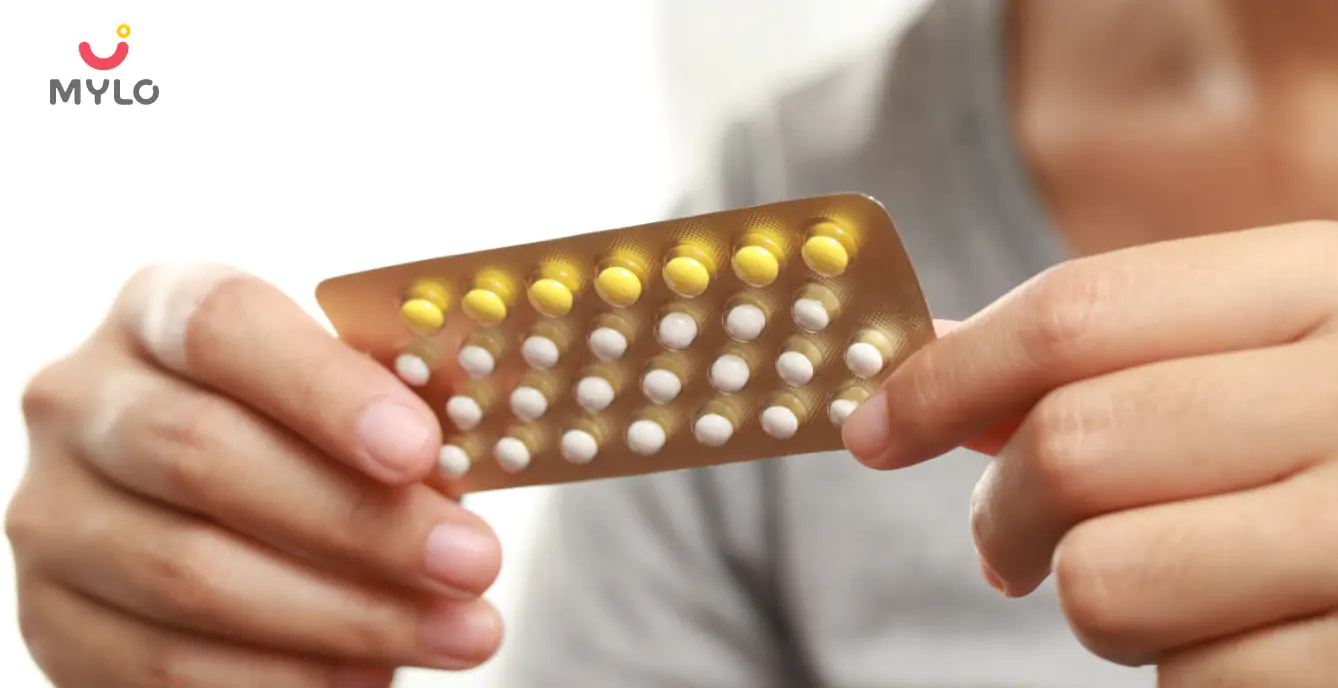Home

Contraceptive

How to Avoid Pregnancy After Having Sex?
In this Article

Contraceptive
How to Avoid Pregnancy After Having Sex?
Updated on 3 November 2023
Every couple wants to have kids, but only when they are ready, and have a proper plan. Although there are several ways to have sex safely, there will be accidents where you might have forgotten to take your pill or experience a contraceptive failure. But before all hell breaks loose, you can read this article to understand how to avoid pregnancy after having sex.
How to Stop Pregnancy After Sex: 1 Day
If you had unprotected sex, or if you had a condom accident, you can still avoid pregnancy after sex with the help of emergency contraception. Commonly known as the morning-after pill, emergency contraception is a safe and effective method to prevent pregnancy after unprotected sex or contraceptive failure. It contains hormones that work by delaying ovulation or preventing the fertilization of an egg. It's important to note that emergency contraception should be taken as soon as possible after unprotected sex to maximize its effectiveness.
The morning-after pill is available over-the-counter at most pharmacies and can be taken up to 72 hours after intercourse, although some brands may be effective up to 120 hours. It is a one-time use pill and should not be used as a regular form of contraception. It's important to consult a healthcare provider for guidance on the appropriate use of emergency contraception.
You may also like: How to Avoid Pregnancy Naturally After Sex?
How to Stop Pregnancy After 1 Month?
In case you find yourself not menstruating after a month of having sex, or have tested positive for pregnancy, you can use pills to avoid the unplanned pregnancy. This is usually called an “abortion pill” and needs to be prescribed by a gynaecologist. Abortion pills, also known as medication abortion or medical abortion, are a safe and effective way to terminate an early pregnancy. It is essential to clarify that abortion pills are used to end a confirmed pregnancy and are typically recommended for pregnancies up to 10 weeks gestation.
Abortion pills typically consist of two medications: mifepristone and misoprostol. These medications work together to end an early pregnancy. Here's how the process generally works:
-
Mifepristone: This medication is taken first and works by blocking the hormone progesterone, which is needed for the pregnancy to continue. By doing so, it causes the lining of the uterus to break down, making it difficult for the pregnancy to be sustained.
-
Misoprostol: This medication is taken within 24 to 48 hours after taking mifepristone. It causes the uterus to contract and expel the contents, including the pregnancy.
How to Have Sex Without the Fear of Pregnancy?
Now that we have understood how to prevent pregnancy after sex, let us understand how couples can engage in sexual intercourse without the fear of pregnancy. There are many tools to prevent pregnancy, but the key is to use them the right way for optimal effectiveness. Here are a few things to consider to have sex without the fear of pregnancy:
1. Hormonal Contraceptives: Birth Control Pills and More
Hormonal contraceptives, such as birth control pills, patches, and injections, are widely used to prevent pregnancy. These methods work by regulating the hormones in a woman's body to prevent ovulation or thicken the cervical mucus, making it difficult for sperm to reach the egg.
There are various types of hormonal contraceptives available, including combination pills, mini-pills, and extended-cycle pills. Combination pills contain both estrogen and progestin, while mini-pills only contain progestin. The choice of hormonal contraceptive depends on individual preferences and medical considerations. It's important to consult a healthcare provider to determine the most suitable option.
2. Intrauterine Devices (IUDs): A Long-Term Solution
Intrauterine devices (IUDs) are a long-term contraceptive option that provides effective protection against pregnancy for several years. They are small, T-shaped devices that are inserted into the uterus by a healthcare professional. There are two types of IUDs available: hormonal and copper.
Hormonal IUDs release progestin, which thickens the cervical mucus and prevents sperm from reaching the egg. They can last up to 3-5 years, depending on the brand. Copper IUDs, on the other hand, release copper ions that are toxic to sperm, preventing fertilization. They can last up to 10 years.
3. Barrier Methods: Protecting Against Unplanned Pregnancy
Barrier methods are physical barriers that prevent sperm from reaching the egg. They include male and female condoms, diaphragms, and cervical caps. Condoms are the most commonly used barrier method as they also provide protection against sexually transmitted infections (STIs).
Male condoms are worn over the penis, while female condoms are inserted into the vagina. Both types of condoms create a barrier that prevents sperm from reaching the egg. Diaphragms and cervical caps are inserted into the vagina to cover the cervix, blocking the entry of sperm into the uterus.
4. Natural Family Planning: Fertility Awareness Method (FAM)
The fertility awareness method (FAM), also known as natural family planning, involves tracking your menstrual cycle to determine your fertile and infertile days. This method relies on observing and recording changes in cervical mucus, basal body temperature, and other physical signs to predict ovulation.
Tracking your cycle for safe days requires knowledge and understanding of your body's natural signs of fertility. By avoiding intercourse during the fertile window, which includes the days leading up to ovulation and a few days after, you can significantly reduce the risk of pregnancy.
However, it's important to note that FAM is not as effective as other forms of contraception and requires strict adherence to the method's guidelines. It's recommended to learn this method from a trained healthcare professional to ensure accurate tracking and interpretation of fertility signs.
5. Withdrawal Method: Coitus Interruptus
The withdrawal method, also known as coitus interruptus, involves the man withdrawing his penis from the vagina before ejaculation. This method aims to prevent sperm from entering the vagina and reaching the egg. However, it is considered one of the least effective forms of contraception due to the difficulty of timing and the possibility of pre-ejaculate containing sperm.
To use the withdrawal method correctly, the man must have good control over his ejaculation and withdraw before any ejaculation occurs. It's important to note that this method does not provide any protection against STIs.
6. Emergency Backup Plan: Copper IUD as Emergency Contraception
In cases where other forms of contraception for how to avoid pregnancy after sex have failed or were not used, a copper IUD can be used as emergency contraception. Copper IUDs can be inserted up to 5 days after unprotected sex and are highly effective in preventing pregnancy. They work by interfering with sperm movement and fertilization, as well as changing the lining of the uterus to prevent implantation.
It's important to consult a healthcare provider as soon as possible if you are considering using a copper IUD as emergency contraception. They will be able to provide guidance on the timing and appropriate use of this method.
7. Double Protection: Combining Contraceptive Methods
For individuals who want extra security, it is possible to combine different contraceptive methods. This is known as double protection. By using multiple methods, such as condoms along with hormonal contraception, the risk of pregnancy is significantly reduced. Additionally, using condoms provides protection against STIs, making it a valuable addition to other contraceptive methods.
When considering dual contraception, it's important to consult a healthcare provider to ensure the compatibility and effectiveness of the chosen methods. They will be able to provide personalized advice based on your specific circumstances.
How to Avoid Pregnancy After Having Sex: Expert Advice
While knowing how to stop pregnancy after sex is crucial in emergency cases of contraception failure but it's important to have a full-proof contraceptive plan in place. Choosing the most suitable contraceptive method can be a personal decision influenced by various factors such as health, lifestyle, and individual preferences. It's important to seek professional advice from a healthcare provider to ensure that you are making an informed decision.
Healthcare providers can provide guidance on the different ways to avoid pregnancy after sex, their effectiveness, and any potential risks or side effects. They can also help address any concerns or questions you may have, ensuring that you have the necessary support throughout your contraceptive journey.
You may also like: How to Get Periods Immediately to Avoid Pregnancy Naturally
How to Use Condoms to Avoid Pregnancy?
While knowing how to avoid pregnancy after sex is important, it's also important to understand how you can use condoms to prevent an unplanned pregnancy:
Choose The Right Condom
The main reason for content is choosing the wrong size or type. If a condom is too big, it can fall off, or if it is too small, it might break. To avoid such problems, make sure to:
- Check the expiry date of the condoms, and throw them out if they're expired.
- Check for holes or tears before having intercourse.
- Choose condoms made of latex, as they are less likely to break.
- Keep them in a dry and cool place.
- Avoid oil-based products like massage oils, petroleum jelly or lotions that can damage latex condoms. Only use water-based lubricants when it comes to latex condoms.
It is also important that you use condoms in the right way in order to avoid pregnancy. Here is a step-by-step procedure on how to put on your condom correctly:
- Open the package carefully, ensuring you do not rip off the condom.
- Gently place the condom at the tip of your penis, ensuring that the rolled side is on the outside.
- Press on the top to remove any air in the tip.
- Gently roll it down until it covers your whole penis.
- Make sure to take it off immediately after having sex, and hold the base before you take it off.
The Bottomline
How to avoid pregnancy after having sex requires knowledge, awareness, and the use of appropriate contraceptive methods. By understanding the menstrual cycle, utilizing emergency contraception, considering hormonal methods, exploring barrier methods, practicing natural family planning, and seeking professional advice, individuals can effectively prevent unplanned pregnancies. It's important to remember that no method is 100% foolproof, and consulting a healthcare provider is crucial in determining the most suitable contraceptive approach for each individual's needs and circumstances.
References
1. Emergency contraception: Preventing pregnancy after you have had sex. (2003). Paediatr Child Health. NCBI
2. P. Frank-Herrmann, J. Heil, C. Gnoth, E. Toledo, S. Baur, C. Pyper, E. Jenetzky, T. Strowitzki, G. Freundl. (2007). The effectiveness of a fertility awareness based method to avoid pregnancy in relation to a couple's sexual behaviour during the fertile time: a prospective longitudinal study, Human Reproduction
Tags
How to Avoid Pregnancy After Having Sex in Bengali, How to Avoid Pregnancy After Having Sex in Tamil, How to Avoid Pregnancy After Having Sex in Telugu



Written by
Priyanka Verma
Priyanka is an experienced editor & content writer with great attention to detail. Mother to an 11-year-old, she's a ski
Read MoreGet baby's diet chart, and growth tips

Related Articles
Related Questions
Hello frnds..still no pain...doctor said head fix nhi hua hai..bt vagina me pain hai aur back pain bhi... anyone having same issues??

Kon kon c chije aisi hai jo pregnancy mei gas acidity jalan karti hain... Koi btayega plz bcz mujhe aksar khane ke baad hi samagh aata hai ki is chij se gas acidity jalan ho gyi hai. Please share your knowledge

I am 13 week pregnancy. Anyone having Storione-xt tablet. It better to have morning or night ???

Hlo to be moms....i hv a query...in my 9.5 wk i feel body joint pain like in ankle, knee, wrist, shoulder, toes....pain intensity is high...i cnt sleep....what should i do pls help....cn i cosult my doc.

Influenza and boostrix injection kisiko laga hai kya 8 month pregnancy me and q lagta hai ye plz reply me

RECENTLY PUBLISHED ARTICLES
our most recent articles

Diet & Nutrition
গর্ভাবস্থায় আলুবোখরা: উপকারিতা ও ঝুঁকি | Prunes During Pregnancy: Benefits & Risks in Bengali

Diet & Nutrition
গর্ভাবস্থায় হিং | ঝুঁকি, সুবিধা এবং অন্যান্য চিকিৎসা | Hing During Pregnancy | Risks, Benefits & Other Treatments in Bengali

Women Specific Issues
স্তনের উপর সাদা দাগ: লক্ষণ, কারণ এবং চিকিৎসা | White Spots on Nipple: Causes, Symptoms, and Treatments in Bengali

Diet & Nutrition
গর্ভাবস্থায় পোহা: উপকারিতা, ধরণ এবং রেসিপি | Poha During Pregnancy: Benefits, Types & Recipes in Bengali

Diet & Nutrition
গর্ভাবস্থায় মাছ: উপকারিতা এবং ঝুঁকি | Fish In Pregnancy: Benefits and Risks in Bengali

Diet & Nutrition
গর্ভাবস্থায় রেড ওয়াইন: পার্শ্ব প্রতিক্রিয়া এবং নির্দেশিকা | Red Wine During Pregnancy: Side Effects & Guidelines in Bengali
- ইনার থাই চ্যাফিং: কারণ, উপসর্গ এবং চিকিৎসা | Inner Thigh Chafing: Causes, Symptoms & Treatment in Bengali
- গর্ভাবস্থায় ব্রাউন রাইস: উপকারিতা ও সতর্কতা | Brown Rice During Pregnancy: Benefits & Precautions in Bengali
- Velamentous Cord Insertion - Precautions, Results & Safety
- Unlock the Secret to Flawless Skin: 7 Must-Have Qualities in a Face Serum
- Unlock the Secret to Radiant Skin: How Vitamin C Serum Can Transform Your Complexion
- Gender No Bar: 10 Reasons Why Everyone Needs a Body Lotion
- Unlock the Secret to Radiant Skin How to Choose the Perfect Body Lotion for Your Skin Type
- Top 10 Reasons to Apply a Body Lotion After Every Bath
- Communication in Toddlers: Milestones & Activities
- How to Improve Vocabulary for Toddlers?
- A Comprehensive Guide to Understanding Placenta Accreta
- Vulvovaginitis in Toddlers Causes, Symptoms and Treatment
- A Comprehensive Guide to Understanding Cerebral Palsy in Children
- Bitter Taste in Mouth During Pregnancy: Understanding the Causes and Remedies


AWARDS AND RECOGNITION

Mylo wins Forbes D2C Disruptor award

Mylo wins The Economic Times Promising Brands 2022
AS SEEN IN
















- Mylo Care: Effective and science-backed personal care and wellness solutions for a joyful you.
- Mylo Baby: Science-backed, gentle and effective personal care & hygiene range for your little one.
- Mylo Community: Trusted and empathetic community of 10mn+ parents and experts.
Product Categories
baby carrier | baby soap | baby wipes | stretch marks cream | baby cream | baby shampoo | baby massage oil | baby hair oil | stretch marks oil | baby body wash | baby powder | baby lotion | diaper rash cream | newborn diapers | teether | baby kajal | baby diapers | cloth diapers |








